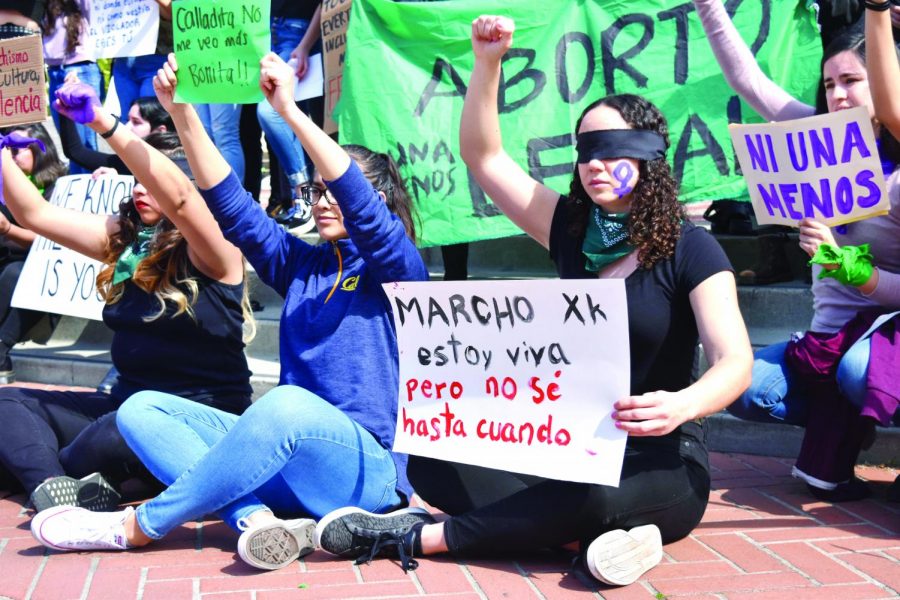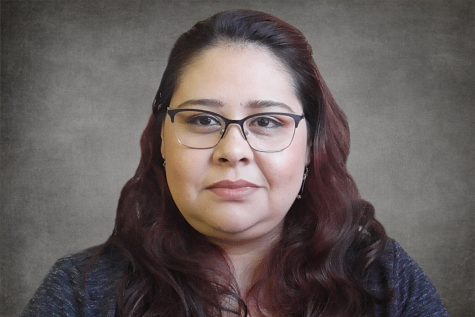The ‘Shadow Pandemic’: Violence against women and girls during COVID-19
Women for Justice in Latin America, a collective formed by UC Berkeley students and community leaders, protest against femicide at UC Berkeley in Upper Sproul Plaza in solidarity with #UnDiaSinNosotras on March 9.
Nov 25, 2020
While the world works overdrive to fight against the current pandemic, the fight against women’s violence is losing momentum as the number of battered women increases.
UN Women – the United Nations department for women’s advocacy – calls the increase of violence against women during COVID-19 the “Shadow Pandemic”.
Before COVID-19 permeated headlines, newscasts were filled with images of women marching worldwide protesting against Femicide.
The Merriam-Webster dictionary defines Femicide as the gender-based murder of a woman or girl by a man.
Due to femicide protests, the public has begun to recognize the stratospheric numbers of cases of violence against women and girls; however, the pandemic halted that progress.
According to the United Nations, before COVID-19, 243 million women and girls age 15-49 experienced sexual or physical violence by an intimate partner in the past year.
Since the pandemic began, violence against women has intensified while resources have decreased.
The urgency to respond to COVID-19 has taken over resources and efforts that could combat violence against women.
UN Women states that “As COVID-19 cases continue to strain health services, essential services, such as domestic violence shelters and helplines, have reached capacity.”
Domestic violence is an issue that is common in the United States. This abuse is often silent and it is not surprising that domestic violence cases are on the rise while we are required to remain indoors.
For many women experiencing domestic violence, it is easier to quarantine at home with an abusive partner who can contribute to living expenses, than to face economic instability alone during the outbreak.
We must keep in mind that not every woman experiences the same kind of violence; nevertheless, every slur, every punch, and every object thrown in a violent outburst leaves devastating consequences on victims that could go on for generations.
When a victim decides to leave an abusive situation, they certainly need support. The nonprofit Department on the Status of Women in San Francisco advises not to force the victim to talk about anything they do not want to talk about and avoid judgment.
Violence toward women might wear many faces, and it could be presented in many different situations. However, it has a common factor: it ends and begins with a man who wants to show the power he has over his victim.
The “Shadow Pandemic” is only the result of the abusive behavior that is part of a systematic pattern of male power deeply ingrained in our society.
A big step towards ending violence against women is recognizing how big of a problem this is.
Women might be fighting on many front lines right now, but we must keep our guard up. We cannot protest on the streets, but we can still use our social media to raise awareness of the “Shadow Pandemic”.
We all must remain vigilant. We all have a sister, a mom, a daughter, or a neighbor who needs to be assured that it is not their fault, and they should never be treated in a violent way.
The National Domestic Violence Hotline is available 24/7 by phone and live chat to discuss your situation and help you identify ways to assist a loved one who may be experiencing domestic violence. Call 1.800.799.SAFE (7233) https://www.thehotline.org/get-help/



